Course modules
What you will study on this degree
Further guidance on modules
Modules are designated core or optional in accordance with professional body requirements, as applicable, and LJMU’s Academic Framework Regulations. Whilst you are required to study core modules, optional modules provide you with an element of choice. Their availability may vary and will be subject to meeting minimum student numbers.
Where changes to modules are necessary these will be communicated as appropriate.
Core modules
Audio Practice
30 credits
30 credits
The lectures will be mainly based around the theory that underpins recording systems along with the peripherals that are usually associated them.
You will investigate the integration of audio and MIDI in modern recording systems through your coursework, which is structured to make you practically apply and demonstrate your understanding and knowledge of the recording environment as well as be creative in your use of the tools we are using.
You should always be aware that much of the theory and practice covered in this module is immediately transferable to other, more specialised areas.
This module is delivered in a lecture and workshop format. The lecture will discuss some of the theoretical or general concepts that you will cover practically in the workshop later.
Technical Foundations – Acoustics and Audio
30 credits
30 credits
This module is delivered primarily through lecture and practical workshop delivery. The content is mostly theoretical and is intended to support understanding in many other areas of the programme, Concepts are introduced and explained in the lecture. The workshops are in various forms some using spreadsheet software to enable efficient calculations and graph plotting, some are more demonstration focussed in the recording studios / digital audio lab, and some are to teach cable building and connectors in a live sound workshop.
Practical assessments are generally arranged in pairs and the exam to assess theoretical understanding is an individual assessment.
Live Sound 1
30 credits
30 credits
Sound for Picture
15 credits
15 credits
Collaborative Technical Project
15 credits
15 credits
This module helps you develop collaboration, planning, time management and project specific technical skills by assigning you to work on one of arrange of practical projects, productions, or performances in LIPA. You will be working with a range of students from other disciplines and will work in pairs or small teams to apply your technical knowledge and skills to the needs of these events. You will be allocated a supervisor from the teaching team who will work with you to help plan and manage your roles, and to provide and bespoke technical instruction required.
Core modules
Advanced Technical Studies – Digital Systems & Processing
30 credits
30 credits
This module is intended to bridge the gap between theoretical concepts and their application especially those relating to current developments in digital audio system related areas such as signal processing, networking, data storage and transmission, and immersive audio.
The content is delivered through lectures where the various ideas are introduced and discusses, and a variety of workshops in the recording and digital audio lab where a variety of tools can be designed, and systems can be compared for the purposes for understanding the technical components within a familiar practical setting.
Professional Preparation 1
15 credits
15 credits
In this module we are going to be focusing our attention on preparing you for employment in the sound related industries.
Sustaining a career in these challenging and competitive sectors requires a long-term perspective. Experience tells us that it takes tenacity, drive and a commitment to continuing professional development that extends far beyond the end of your degree studies. We hope to foster these principles in your own approach to professional life so that you can gain, and sustain, rewarding work in evolving industries.
Encouraging you to become more proactive in your exploration of industry is a key aim. We want you to become better able to identify opportunities in industry; we also want you to become better equipped to take advantage of these by planning 3rd year projects that will enable you to acquire the key skills and experience that industry demands.
We will present a number of sessions that more thoroughly explore key employment sectors in our field, including some sessions delivered by guest practitioners from industry. We will also endeavour to engage with graduates of the course to enable insight into the process of breaking into industry and establishing yourself, as well as building networking opportunities.
Optional Modules
Music Recording
30 credits
30 credits
Students will learn increasingly complex and sophisticated studio tools and incorporate these into their studio-based practice. These will include a range of analogue, digital, hybrid and virtual consoles, samplers & synthesizers, and advanced MIDI & synchronisation protocols. We will also revisit core studio tools introduced at Level 4 and apply them with increasing sophistication in the processes of recording, mixing, and mastering a high-quality recorded work.
Live Sound 2
30 credits
30 credits
Audio Post Production
30 credits
30 credits
Music Production
15 credits
15 credits
This module encourages students to view music production from the perspectives of audience and industry, adopting primarily aesthetic and commercial views of music recording, and to take a critical approach to the identification and practical application of stylistic conventions and qualities in a contemporary music genre.
Sound Design for Theatre
15 credits
15 credits
Broadcast Audio
15 credits
15 credits
Core modules
Final Portfolio
60 credits
60 credits
Students will propose the specific projects they wish to work on at the start of the teaching year, or where feasible, at the end of Level 5. This proposal will outline the projects, their deliverables, and suggest the weighting that each project will contribute to the final product mark. They will also identify an area of research that will be applied to one or more elements of the practical portfolio. This proposal is then confirmed by the module leader, and a suitable supervising tutor allocated based on the practical specialisms of the core staff team. Students will be required to meet with their tutor in regular meetings where milestones will be agreed and monitored, culminating in the submission of project work and research essay followed by in individual student presentation.
Professional Preparation 2
15 credits
15 credits
The content in this module will help each participant identify an appropriate direction and pathway for their first career steps, develop a personalised strategy for self-promotion, become increasingly confident in interactions with other (sometimes senior) professionals, and gain a clearer understanding of how to manage their personal and business finances.
Optional Modules
Advanced Studio Production
30 credits
30 credits
This module will help students extend and consolidate their professional practise in the area of music recording by introducing them to new tools such as Ableton Live, and new mixing processes such as Atmos Music.
Advanced Live Sound
30 credits
30 credits
Advanced Post Production
30 credits
30 credits
Game Audio
30 credits
30 credits
In this module students will gain an insight into the broader workflows and tools commonly used in the development of games and adaptive media. They will develop their skill and experience by devising, creating, and implementing audio assets using established industry tools and techniques, including specialist sound design and mixing tools.
Video Production
15 credits
15 credits
Lighting, Rigging and Power
15 credits
15 credits
Location Recording
15 credits
15 credits
Tuition fees and funding
Entry requirements
Please choose your qualifications below to view requirements
Grades/points required from qualifications:
Work out how many UCAS points your qualifications are worth by visiting the UCAS Tariff Calculator.
Qualification requirements
GCSEs and equivalents
GCSEs
We normally require a minimum of five GCSEs grade C. These should include Maths, English and Physics/Dual Science Award. Plus a minimum of 112 UCAS tariff points (2017 tariff) or 280 UCAS tariff points (2016 tariff).
We accept all types of equivalent qualifications, the following are the most common UK qualifications that people tend to apply to us with:
A levels
The minimum educational standard that we are looking for is:
A/AS Level
This should be from three A Levels (i.e. grades B, B, C), excluding General Studies. Points from AS and Key Skills are not counted
BTECs
Extended Diploma (i.e. Distinction, Merit, Merit profile). BTEC Diploma (i.e. Distinction*, Distinction). Acceptable on its own and combined with other qualifications such as an A Level, in which case total needs to be 112 (2017 UCAS tariff points) or 280 (2016 UCAS tariff points) across both qualifications. 90 Credit Diploma but needs to be combined with other qualifications such as an A Level, in which case total needs to be 112 (2017 UCAS tariff points) or 280 (2016 UCAS tariff points).
International Baccalaureate
Acceptable on its own and with other qualifications.
Welsh awards
Welsh Baccalaureate
Needs to be combined with other qualifications as it is equivalent to one A Level.
Alternative qualifications considered
Equal Opportunity
LIPA is an equal opportunities organisation and aims to successfully recruit students from a wide range of different socio-economic and personal backgrounds. To ensure we provide effective equality of opportunity within the application process we carefully consider each application individually and acknowledge differences that can exist between applicants’ experiences from diverse backgrounds. We regularly update our approaches to take into account changing understanding of communities and cultures and we monitor applicant/student characteristics such as age, gender and ethnicity.
Recognition of Prior (Experiential) Learning [RP(E)L] and Credit Transfers
If you can demonstrate that you have already achieved learning equivalent to a module or modules, or a level of study, in the programme then you may be eligible to be awarded credit for this learning or to have credit transferred from another UK institution. You will be required to complete an application to have your qualifications or experience approved by the Head of Discipline and the university. This requires the presentation of appropriate evidence and we will map the evidence against the programme outcomes to be certain of equivalence. If approved credit will be awarded and you will proceed on to the appropriate level of the course to complete the remaining credit for the award.
Additional requirements
-
Interview required
Audition or Interview
Candidates are invited to audition/interview on the basis of completing the LIPA and/or UCAS application form. We look for evidence of the key attributes and an ability to achieve the qualifications standard. In exceptional cases people may be invited to audition/interview who have not met or are not on course to meet the qualifications standard. In these cases there must be substantial potential demonstrated against the other attributes. The audition or interview allows us to evaluate you as a practitioner in your area of interest. Offers of a place will follow where you demonstrate high ability and the potential to succeed. At the interview for this course, candidates take part in a group interview during which they present elements of their portfolio. They also undertake a written test.
International requirements
Other international requirements
We welcome applications from students with qualifications from outside of the UK. Each application is considered on an individual basis and mapped to the appropriate entry level. We value the diversity of experience that students from different backgrounds bring to the course. IELTS score of 6 is required.
Other international requirements
We are committed to accepting students on to this course who have the potential to succeed as practitioners and who will gain sustained work in the performing arts and entertainment industries. With this in mind we wish to identify through applications and interview or audition key attributes and achievements. The key attributes that we seek to identify are:
- Knowledge, ability and experience of sound technology
- Commitment to the performing arts
- Ability to work effectively with others
- Broad interest and engagement
- Self-awareness
- Spirit of enterprise
How to apply
Securing your place at LJMU
Your university life
From accommodation and academic support to clubs and societies. Find out what LJMU has to offer.
Related Links
Talk to our students
Connect with a current LJMU student for advice and guidance on university life, courses and more.
See what our students are saying
At LJMU we want you to know you're making the right choice by studying with us. You can see what our students are saying about their experience with us through their reviews on the following websites:
Related Links
News and views
Browse through the latest news and stories from the university


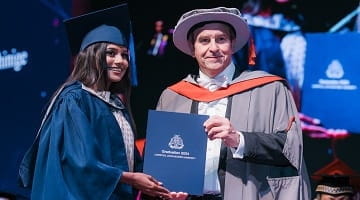
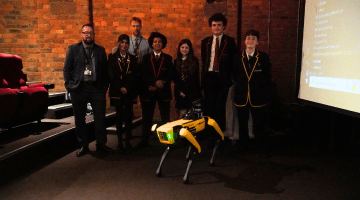
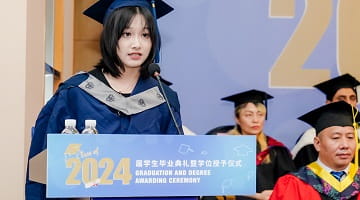

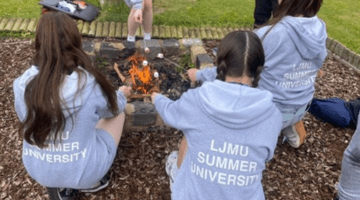

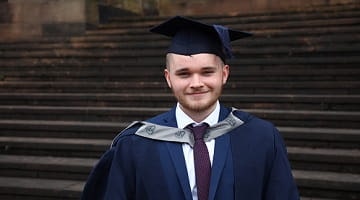
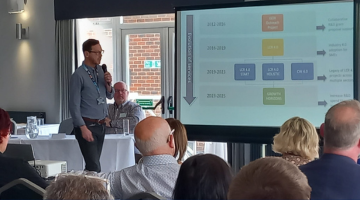
The university reserves the right to withdraw or make alterations to a course and facilities if necessary; this may be because such changes are deemed to be beneficial to students, are minor in nature and unlikely to impact negatively upon students or become necessary due to circumstances beyond the control of the university. Where this does happen, the university operates a policy of consultation, advice and support to all enrolled students affected by the proposed change to their course or module.
Further information on the terms and conditions of any offer made, our admissions policy and the complaints and appeals process.















